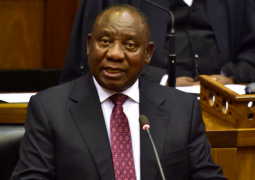
In his reply to his State of the Nation Address debate which took place during the joint sitting of Parliament yesterday, President Cyril Ramaphosa thanked the Members of Parliament for upholding a widely held view that his presidency signalled a new dawn and new social compact that seeks to build an economically secure and an equal South African society.
This debate was meaningful in many ways, said the President, for it was characterised by a noble decorum which restored the dignity of Parliament. “Even though we differed on one thing or the other, the respect shown by Members to each other and the way we carried this debate through has maintained and restored the dignity of the House,” he said.
We need to see ourselves and how we conduct ourselves in this House through the prism of our people because this is not our House, it belongs to them, he said. “This House does not belong to us, but to our people. We are here sent by them to represent them. When we are in this House, built with their blood, sweat and tears, we are expected to behave in the manner that they expect us to behave in their House.”
He said he was humbled by the fact that his address seemed to have captured people’s imaginations. “I have seen a positive response to my address on social and traditional media by people from all walks of life and I am humbled and encouraged by that.”
Most of all, the debate on Sona has left many South Africans infused by the dawning of the new era that seeks to herald a new sense of patriotism and a better South Africa, he said. “Sona has galvanised our patriotism. And shown our ability to overcome our narrow party political interests. It has a demonstration of the fact that tomorrow will be better than today. That we have a better future and a better tomorrow.”
But most interesting is the pervasive willingness by the people of every ilk I meet during my morning walk-about to lend a hand where they can, he said. “Wherever I meet them they say ‘Mr President send us, send me to lend a hand’ – and that is encouraging.”
But what we should all take away from the Sona debate is that the progress of this country should not be measured by our gross domestic product, but by how the lives of the most marginalised can be changed for the better, he said. “Our greatest concern should be those who have the least: who are unemployed and poor. Those whose taps run dry whether there is a drought or not. The orphaned, the homeless and those who rely on old age pension for their livelihood.”
Replying to the allegation that he is a President with no plan that is why he made several announcements on the inception of summits and conferences to chart a new trajectory, he aptly replied: “This government has a plan, its plan is the National Development Plan.”
He further stated that his insistence on the inception of summits and commissions with organised labour, business and civil society, is a strategy to find consensus from critical role players in our society on how to take the country forward. “We must never underestimate the need to forge consensus on all that we seek to do as a nation.”
The consensus-seeking mechanisms in dealing with our national issues is an ideal that stems from the inception of two key documents that proved to be the architects of our democracy: the Freedom Charter and our Constitution, he said. “The Freedom Charter, which is still a blueprint of what we still aspire for, was based on consensus. Our Constitution stems from the 1.7 million submissions, that is why South Africans regard it as their own. It is now accepted as a document that represents their views and that defines their identity as South Africans.”
These summits and commissions, he pointed out, are meant to carve a new social compact that will accelerate the ideals of our developmental state, that will bring about an inclusive economic growth, something we must all be committed to work together to achieve.
We may differ on what tactics or strategies to be used to take this country forward, but what we all agree on is to advance the will of the people, he said.
One of the teething issues that many South Africans won’t disagree on is that we need to address the land question, which he referred to as the original sin that still haunts us 23 years into our democracy. He further stated that the call for the expropriation of land without compensation should not be seen as a threat. And it would be handled responsibly. “We must not view the expropriation of land without compensation as a threat, but an opportunity to heal the divisions of the past. And we won’t make mistakes that others did. We will handle it with responsibility and not damage our agricultural industry, which is one of the pillars of our economy. We can assure you of that.”
In a bid to salvage state-owned enterprises from their downward spiral, he said a new ownership model would be incepted to ensure there is effective oversight, good governance and financial management in these entities. “The State Coordinating Council will provide a high-level strategic direction. And its social and economic mandate will be much more clearer.”
He also promised that there will be an assessment of the size and the economic impact of the Cabinet and government departments and this will include engagement with various role players to ensure that consensus is reached on this matter. “I know many of you wanted this to be done yesterday. Let’s not be ahead of ourselves. We want to make an informed decision on this matter. And it’s only then that a proper decision will be made on this matter.”
By Abel Mputing
20 February 2018

